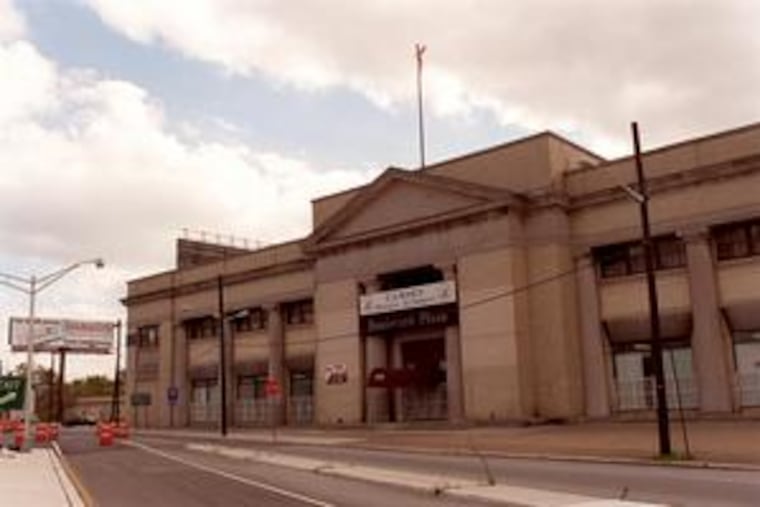If Sears building stays, Campbell's says it might go
Camden's quandary could come up for a vote tonight. The firm wants to expand.

Camden has a proud history as a center of commerce and industry, but in recent decades the city has known little good economic news.
So it's not without some painful irony that the city now is faced with the choice of preserving the past or, potentially, securing the future.
Camden leaders must decide whether to tear down the old Sears, Roebuck & Co. building - a national historic landmark - to make way for an expanded Campbell Soup Co. headquarters.
If they save the Sears building, they risk losing Camden's last Fortune 500 company at a time when the soup giant is willing to invest millions in the moribund city.
"If the demolition of the Sears building does not take place, we will be forced to evaluate all our options - one of which is, yes, to move," Anthony J. Sanzio, Campell's director of corporate communications, said last week.
In place of the Sears building, a fixture on the Admiral Wilson Boulevard since 1927, Campbell's proposes a $72 million building that would expand its corporate headquarters and a sprawling office park that might attract jobs to Camden.
"It puts the city in a dilemma. It's a choice between history and progress," said Mayor Gwendolyn Faison. "I believe any historical monument should continue to have impact. . . . Most historical sites are museums for tourists, something of value, not ugly and vacant and not producing."
But, so far, Camden has sided with the past. The city's Historic Preservation Commission, which has a nonbinding advisory role in the process, voted unanimously earlier this month to oppose demolition of the Sears building.
Tonight, the issue lands before the city Planning Board. It's unclear whether the board will vote on the matter. Even if the board agrees to raze the building, the plan still would have several more hurdles to clear.
Complicating matters, businessman Ilan Zaken told the Historic Preservation Commission that he would like to purchase the Sears building and make it the headquarters for two of his clothing retail businesses, one of which is Dr. Denim.
He said he has 20 retail locations in Philadelphia, Baltimore and Atlanta.
"I'm looking for a warehouse and offices," said Zaken, under questioning from his attorney. "I'm aware of all of the issues with the Sears building."
Faison said she was willing to consider Zaken's offer, but she had concerns.
"Is Dr. Denim really serious?" she asked. "If he's serious, why is it just coming up now?"
At the Planning Board meeting, to be held in City Council chambers in City Hall, Campbell's officials are expected to argue, again, that the Sears building is standing in the way of its proposed 80,000-square-foot office building.
Or, as Campbell's attorney, Ed Sheehan, told the historic commission, "if that building stands, those buildings will not rise."
Historic commission member Paul Schopp, a historian for an environmental planning firm, expressed displeasure at Campbell's "all or nothing" approach to the problem.
"You're saying play our way or we'll pick up and go home. Compromise and negotiations form the basis of our society," said Shopp. "Demolition should always be viewed as the last resort."
Sanzio, Campbell's spokesman, said after the commission's vote that the company was hoping for better luck before the Planning Board.
"We remain optimistic," he said. "The $72 million expansion is a great benefit far outweighing the Sears building."
Campbell Soup, which was founded in Camden and has remained there for nearly 140 years, still plays a major role in the city's economy. The company pays $1.3 million annually in lieu of taxes, donates more than $1 million to local charities, and provides 1,700 jobs, though critics complain few are held by Camden residents.
But, like most manufacturers who once made Camden a boomtown, Campbell's closed its Camden factory, more than a decade ago.
The expanded headquarters would deepen Campbell's roots and reduce fears that the company might leave the city.
In February, with Gov. Corzine in attendance, Campbell's officials announced that the new complex would be built on 110 acres that included the Sears structure and the old Canal Liquor store parking lot.
They said at the time that construction on the new site would begin this month and be completed in November 2008.
But last week the forces of opposition seemed to be rising to protect the building that was once the retail center of Camden - a place where shoppers from the city and surrounding suburbs bought everything from washing machines and lawn mowers to clothing and holiday toys.
The Sears building, renowned for its Greek Revival-style architecture, was on the cutting edge of retail in its day - built outside of the crowded downtown, with plenty of parking for the new, automotive world.
Similar Sears sentimentalism greeted former Gov. Christine Todd Whitman when she tried to tear down the Sears building in 1999 as part of a makeover of the Admiral Wilson Boulevard for the Republican National Convention. A number of other commercial properties were acquired and demolished to provide an unobstructed view of the Cooper River, but the Sears Building remained.
Supporters such as former building owner Mark J. Willis and civic activist Frank Fulbrook make the same argument they made then - that the building is of historic value to Camden and is still capable of bringing jobs to the city.
Sears closed the store in 1971, when it opened a new one in Moorestown.
Historian Howard Gillette, author of a book about the city called Camden After the Fall, said it would be a sign of "how capitalism ran over history" if the Sears building were demolished.